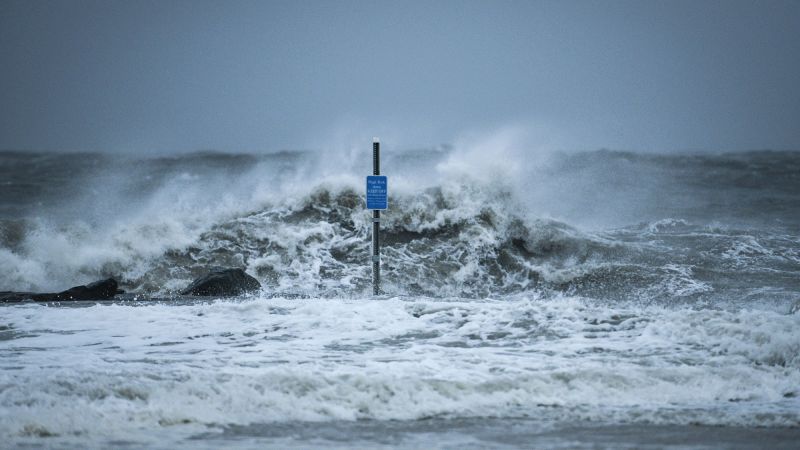Slowing Ocean Currents: Accelerating US Sea Level Rise?

Welcome to your ultimate source for breaking news, trending updates, and in-depth stories from around the world. Whether it's politics, technology, entertainment, sports, or lifestyle, we bring you real-time updates that keep you informed and ahead of the curve.
Our team works tirelessly to ensure you never miss a moment. From the latest developments in global events to the most talked-about topics on social media, our news platform is designed to deliver accurate and timely information, all in one place.
Stay in the know and join thousands of readers who trust us for reliable, up-to-date content. Explore our expertly curated articles and dive deeper into the stories that matter to you. Visit Best Website now and be part of the conversation. Don't miss out on the headlines that shape our world!
Table of Contents
Slowing Ocean Currents: Accelerating US Sea Level Rise? A Concerning Trend
The Atlantic Meridional Overturning Circulation (AMOC), a crucial system of ocean currents that acts like a giant conveyor belt, is showing signs of slowing down. This alarming trend has scientists increasingly concerned about its potential impact on the US, particularly regarding accelerated sea level rise along the East Coast. While the exact mechanisms and future projections are still under investigation, the implications are significant and warrant immediate attention.
What is the AMOC and Why is it Important?
The AMOC is a vast system of interconnected ocean currents that transports warm water from the tropics northward towards the North Atlantic. This warm water releases heat into the atmosphere, influencing weather patterns across the globe and playing a critical role in regulating the Earth's climate. Conversely, colder, saltier water sinks in the North Atlantic, creating a continuous circulation loop. This process is vital for maintaining stable sea levels and temperature distribution.
Think of it as a giant heat pump for the planet. Disruptions to this system can have far-reaching consequences.
The Evidence of Slowdown and its Potential Link to Sea Level Rise
Recent studies have indicated a weakening of the AMOC, potentially at its slowest point in over a millennium. This slowdown is largely attributed to climate change. Melting glaciers and ice sheets are introducing large amounts of freshwater into the North Atlantic, reducing the salinity and density of the water, hindering its ability to sink and drive the current.
This weakening has several implications for US sea level rise:
- Increased Water Accumulation: A slower AMOC means less warm water is being transported northward. This leads to a build-up of water in the North Atlantic, which can contribute to higher sea levels along the US East Coast.
- Changes in Coastal Currents: The AMOC's slowdown can also alter coastal currents, impacting erosion patterns and increasing vulnerability to storm surges.
- Amplified Regional Warming: Reduced heat transport from the tropics could lead to regional cooling in some areas, while potentially exacerbating warming in others, further complicating climate models and predictions.
The Uncertainties and Future Research
While the link between AMOC slowdown and accelerated US sea level rise is increasingly evident, much remains uncertain. Scientists are still working to refine climate models and improve their ability to predict the precise magnitude and timing of future changes. Further research is needed to fully understand the complex interplay of factors influencing the AMOC and its regional impacts. This includes more detailed observations of ocean currents, improved climate modeling techniques, and a deeper understanding of the feedback mechanisms within the climate system.
What Can Be Done?
Mitigating climate change through significant reductions in greenhouse gas emissions is paramount to slowing the AMOC decline and its associated consequences. This requires a global effort encompassing policy changes, technological advancements, and individual actions to reduce our carbon footprint. Investing in research and monitoring efforts is also crucial to improve our understanding of the AMOC and its effects on sea levels and coastal communities.
Conclusion:
The slowing of the AMOC presents a serious challenge, with potential implications for the US East Coast’s vulnerability to sea-level rise. While uncertainties remain, the accumulating evidence necessitates urgent action to address the root cause – climate change. We need a concerted global effort to mitigate emissions and further research to understand and predict the future impacts of this critical ocean current system. The time for inaction is over. The future of our coasts depends on it.
Keywords: AMOC, Atlantic Meridional Overturning Circulation, sea level rise, climate change, ocean currents, US East Coast, global warming, climate modeling, coastal erosion, storm surges.

Thank you for visiting our website, your trusted source for the latest updates and in-depth coverage on Slowing Ocean Currents: Accelerating US Sea Level Rise?. We're committed to keeping you informed with timely and accurate information to meet your curiosity and needs.
If you have any questions, suggestions, or feedback, we'd love to hear from you. Your insights are valuable to us and help us improve to serve you better. Feel free to reach out through our contact page.
Don't forget to bookmark our website and check back regularly for the latest headlines and trending topics. See you next time, and thank you for being part of our growing community!
Featured Posts
-
 Triple A To Mlb Dodgers Add Pitching Depth With Roster Change
May 18, 2025
Triple A To Mlb Dodgers Add Pitching Depth With Roster Change
May 18, 2025 -
 Dodgers Bolster Pitching Staff Triple A Recall Impacts Roster
May 18, 2025
Dodgers Bolster Pitching Staff Triple A Recall Impacts Roster
May 18, 2025 -
 The Pete Rose Hall Of Fame Question Insights From 12 Current Members
May 18, 2025
The Pete Rose Hall Of Fame Question Insights From 12 Current Members
May 18, 2025 -
 Los Angeles Angels Woes Deepen Injuries And Jansens Underperformance
May 18, 2025
Los Angeles Angels Woes Deepen Injuries And Jansens Underperformance
May 18, 2025 -
 Kakegurui On Netflix Whos In The Cast Of This Popular Anime
May 18, 2025
Kakegurui On Netflix Whos In The Cast Of This Popular Anime
May 18, 2025
Latest Posts
-
 Kerri Pegg And The Encro Chat Scandal Details Of An Illegal Affair
May 18, 2025
Kerri Pegg And The Encro Chat Scandal Details Of An Illegal Affair
May 18, 2025 -
 Encro Chat Crackdown How A Prison Officers Secret Relationship Came To Light
May 18, 2025
Encro Chat Crackdown How A Prison Officers Secret Relationship Came To Light
May 18, 2025 -
 From Graduation To Netflix Weekend Streaming Picks For New Grads
May 18, 2025
From Graduation To Netflix Weekend Streaming Picks For New Grads
May 18, 2025 -
 Minnesota Twins Extend Win Streak To 12 Joe Ryans Crucial Role
May 18, 2025
Minnesota Twins Extend Win Streak To 12 Joe Ryans Crucial Role
May 18, 2025 -
 Twins Winning Streak Hits 12 Analyzing Joe Ryans Impact
May 18, 2025
Twins Winning Streak Hits 12 Analyzing Joe Ryans Impact
May 18, 2025
